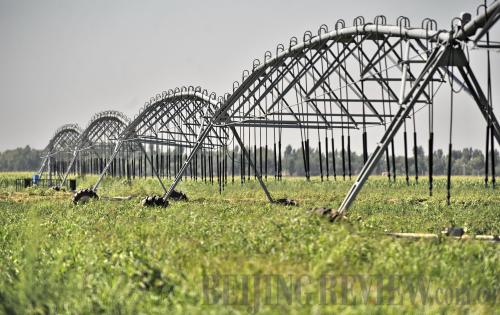|
"International cooperation is needed in both mitigating and adapting to climate change," said Lin. Some international organizations have also stepped up their support of China's efforts in dealing with climate change. According to Lin, nine UN institutions have cooperated with the Chinese Government on provincial projects to deal with climate change. "China is a developing country with limited technological and economic capabilities. International cooperation helps a lot in this respect," Lin said.
China brought 42 technological innovations in six fields to Copenhagen in hopes of negotiating with developed countries about transferring technology.
Low-carbon development
 |
|
CONSERVING WATER: Farms in Inner Mongolia Autonomous Region make use of modern irrigation equipment to save water (LI XIN) |
The Chinese Government had already announced before the Copenhagen conference a clear and quantified emissions reduction goal. It committed to carbon dioxide emissions decreases by 40 to 45 percent per unit of gross domestic product (GDP) by 2020 compared with the level of 2005.
"Given China's large population and relatively low level of economic development, it is a great challenge to set such a goal. It represents the best efforts that China can make at the expense of its economic growth rate," said Lin.
According to the UN Framework Convention on Climate Change, the Kyoto Protocol and the Bali Roadmap, Lin said, developed and developing countries have different responsibilities and obligations in how they deal with climate change.
"We are now still at the stage of industrialization and urbanization; there will be an increasing need for energy, and carbon dioxide emissions will go up as well. But it is still possible to lower this increase to that of the expansion of the economy," said Lin.
In November 2009, a State Council meeting decided to strengthen forest management through forestation projects. By 2020, China's forest area will increase by 40 million hectares compared to that of 2005, and forest reserves will increase by 1.3 billion hectares compared to those of 2005.
"Taking this into account, China will make more contributions to reducing carbon dioxide emissions," said He. "In 2020, China will still be at the stage of industrialization and urbanization while carbon dioxide intensity will not have gone down. However, saving energy and protecting the environment are a must for sustainable development, so we need to figure out a new low-carbon way to both develop the economy and be environmentally friendly," said He.
China has already done much to deal with climate change and reduce carbon dioxide emissions.
"From 2006 to 2008, China conducted 10 energy-saving projects, including offering subsidies to install solar- and wind-power equipment. In the past three years, energy consumption per unit of GDP has decreased by 10.1 percent, which is a remarkable achievement," said He.
During the same period, the country has been actively developing new energy and renewable energy. Production of new and renewable energy increased by 60 percent from 2006 to 2008.
Low-carbon development has been seen more and more important in rural communities in recent years. The first low-carbon ecological village, named Red Cross Lehe Home, was set up in Daping Village, in Sichuan Province's Pengzhou City, which was severely damaged during the May 12 earthquake in 2008. The houses have been rebuilt with wood and earth, accommodate both residents and tourists and the area's farmland produces only eco-friendly fruits and vegetables, which are delivered to cities for sale. Similar villages have been set up in other provinces.
Soil, including natural grasslands, is a huge reservoir of carbon. Developing organic agriculture, according to research by the Chinese Academy of Agricultural Sciences, could reduce carbon dioxide emissions by 25 percent. The technique combines the nutrition and energy within organic agricultural systems and avoids chemical fertilizer, which contributes to climate change. | 